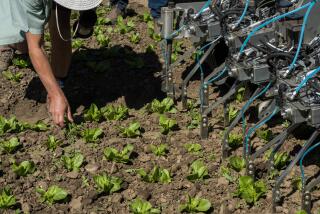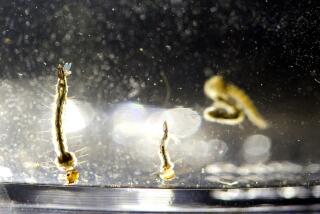Genetically Engineered Strains of Corn Are Yielding Kernels of Interest
MYSTIC, Conn. â This corner of coastal New England is home to more than just top-secret submarine construction and research.
In a barn-shaped building protected with a security door, researchers are tweaking genes and mapping DNA to grow strains of super corn that can stand up to insects, disease, herbicides and drought.
DeKalb Genetics Corp. will soon reap the benefits of almost seven years of work, when farmers far from New England sow the first commercial crops genetically engineered to resist the weed-killer Liberty.
Other strains of corn are on the way that resist the European corn borer--a tough little bug that does more than $1 billion in damage to the corn crop each year.
Randy Bader of Monroe, Wis., will plant a test crop of DeKalbâs corn borer-resistant corn this year at his 5,000-acre Carrousel Farms.
âWe have high hopes for it,â he said. âThe technology today is just amazing.â
Because the genetically altered seed will cost about $11 more an acre to plant than regular seed, Bader will use it only on about 150 acres this year.
âIf the economy works and if we are getting the amount of corn borers down and if the yield isnât lost, anybody would love to have it,â he said.
DeKalb, which is based in DeKalb, Ill., is one of several agribusinesses competing in a high-tech field that promises to revolutionize agriculture.
DeKalb opened its Connecticut research center in 1992. It was a most unlikely place for high-tech agricultural research. The area is best known for its maritime interests--nuclear submarines are built and homeported in neighboring Groton, while Mystic is synonymous with its replica of an old New England seaport and its aquarium.
The 65,000-square-foot center features giant computer-controlled greenhouses where corn stalks grow to 15 feet. They are sterile high-tech labs with enough DNA mapping equipment to rival a criminologistsâ lab.
No longer do scientists have to wait years, crossbreeding and growing plants, to come up with the desired result.
âWe can grow a plant to a couple of inches and look at its DNA, instead of growing the plant to full size, dumping a bunch of insects on it and seeing what happens,â said Dr. Catherine Mackey, the laboratoryâs director and a vice president of research for DeKalb.
About 60 scientists work in the laboratory, where research findings and expected seed prices are closely guarded because of the highly competitive nature of the business.
In January, DeKalb said its scientists scored a big advantage with the first product patent for Bt corn--insect-resistant plants that have been engineered with genes from bacteria to kill the corn borer.
Using tissue from corn embryos and specially developed growth mediums, DeKalb scientists âbombardâ the tissue with powdered gold that has been coated with the desirable DNA, said research scientist Susan Zachwieja.
The new DNA-infused tissue is then tested to see if it shows resistance to whatever undesirable insect or chemical that corn encounters.
From there, the plants are either coddled as they grow or subjected to various trials--by bugs, drought, weed killers and insecticides--to see which lives or turns brown and dies.
Genetically engineered crops are expected to have environmental benefits. For example, corn farmers used to shy away from the weed killer Liberty, because it would damage the crop, Mackey said. With the new Liberty-resistant corn developed by DeKalb, farmers can use the herbicide without fear.
DeKalbâs competitors include Mycogen Corp. and Ciba-Geigy Corp., which also have versions of genetically engineered corn that will be available for commercial use this year.
The rush to develop genetically engineered crops has led to a flurry of mergers and buyouts. In December, seed giant Pioneer Hi-Bred of Des Moines completed a $51-million agreement with Mycogen to collaborate on genetic engineering projects. In February, Monsanto Co. of St. Louis agreed to pay DeKalb $158 million to buy a big stake in the company and share in the research.
Monsanto and other companies have already begun to market Bt potatoes and Bt cotton, designed to ward off other insects, and soybeans that resist the weed killer Roundup.
Some scientists also have concerns about the way genetically engineered crops have been developed.
Dr. Jane Rissler, who holds a doctorate in plant pathology, has been tracking genetically engineered crops for the Union of Concerned Scientists, a watchdog group. Rissler contends genetically engineered crops hold some risks that should be explored.
Bt corn uses genes from a kind of bacteria that has been used for years to fight off bugs and is especially popular with organic farmers. Rissler said bugs such as corn borers develop resistance over time to insecticides, including the Bt bacteria. The fear is that Bt corn will accelerate the borersâ development of resistance and ultimately make the bacteria useless for everybody, she said.
Rissler and other scientists also worry that Bt corn will travel to countries where wild corn is prevalent and transfer the foreign genes, perhaps making the wild corn more weed-like and disrupting the diversity of the crop.
At DeKalb, scientists are developing successive generations of Bt corn faster than bugs can develop resistance to them, Mackey said.
She also said the corn will only be sold in the United States, so it cannot travel to other countries, and that the amount of genetically engineered crops will be such a small percentage of the total corn crop that bugs will have plenty of other places to flourish.






